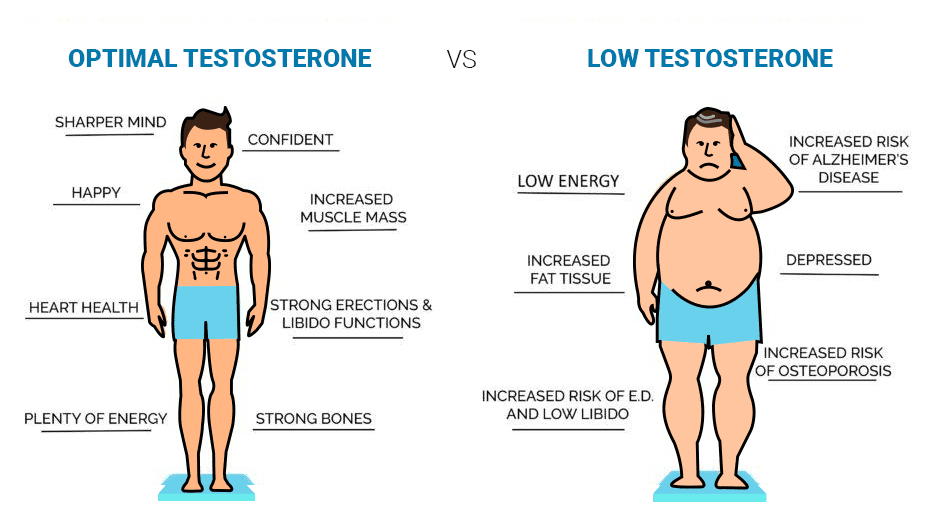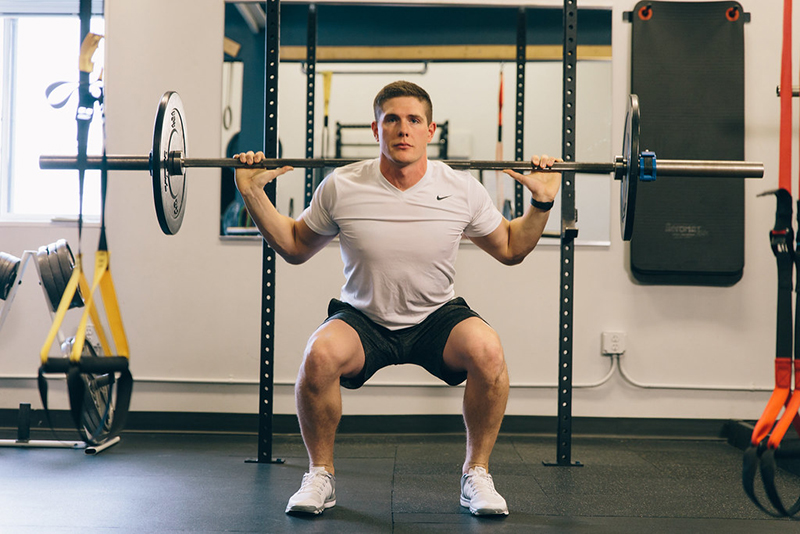We ship worldwide from the USA and UK
PRIME MALE BLOG : GET BACK TO YOUR PRIME
We ship worldwide from the USA and UK
PRIME MALE BLOG : GET BACK TO YOUR PRIME
Think testosterone is all about building muscle? Guess again. It turns out there might be more benefits to the male sex hormone than muscle size alone. According to research, testosterone can help with weight loss too.
Table of Contents
Testosterone is arguably the most important hormone you have and most of it is produced inside the testes.
Hormones are signalling molecules used to send messages around the body. Testosterone itself triggers many crucial changes throughout your life [1].
It makes masculine traits like muscle mass, increased height, and voice deepening emerge during puberty for a start.
Testosterone then continues to thrive well into early adulthood. Here it’s responsible for helping to regulate mood, sex drive, fertility, bone density, and body composition. Yes, testosterone can even affect the way your fat is distributed.
Normal testosterone levels for men sit between 300 – 1,000 ng. dL.
You’re at your androgen hormone-producing peak in your late teens. Everything then starts to level out in your 20s, before dropping off slightly after 30.
Age-related testosterone decline is inevitable [2][3], yet, your lifestyle still matters. Filling your days with exercise, great sleep, and good food are simple steps that support your hormones.
In 2007, a large study published in the Journal of Clinical Endocrinology reported a substantial drop in the testosterone levels of US men since 1980 [4].
The decline in levels averaged around 1% each year too, meaning 21st-century men live with decades worth of dropped androgens compared to our predecessors.

When testosterone levels dip below the 300 ng. dL baseline, they’re considered abnormally low. Hypogonadism is the technical term for this condition, but most men use the simpler expression low testosterone.
Low testosterone can severely affect your well-being. All the benefits of robust testosterone production can be diminished, leaving you feeling weak, lethargic, and irritable. Symptoms of low testosterone include:
Naturally, any of these side effects can significantly alter your wellbeing. Many men faced with low testosterone say it disrupts their life.
Age-related low testosterone is typically reserved for older men and many doctors don’t provide treatment.
However, modern, stressful lifestyles full of anxiety, low levels of exercise, and bad diets can cause havoc on your hormones. Experts have also found a connection between low testosterone and obesity.
Obesity is incredibly bad for your health. Heart disease, cancer, diabetes, osteoarthritis and chronic kidney disease are some of the more severe risks associated with carrying too much body fat [5].
In 2010, experts estimated that 3.4 million deaths had been caused by being either overweight or obese [6]. They then reported that the global count of overweight men grew from 28.8% in 1980 to 36.9% in 2013 [7] That number reached 39% in 2017 with 13% of the world’s men now classed as obese.
Apparently, obesity might be a cause of lower life expectancy in the future [8]. We could literally take a step backwards after generations of extending the average lifespan.
But what does it all have to do with testosterone?
Testosterone and obesity are a dangerous double-edged sword. Because while obesity can cause low testosterone, low testosterone can also cause obesity.
They both influence each other in a hormone-suppressing feedback loop.
Earlier we saw that testosterone plays a part in body composition. The powerful androgen hormone has the ability to boost muscle building, and in turn, promote fat loss [9][10][11].
Men with thriving testosterone typically find it easier to stay leaner than their hypogonadal peers.
Low testosterone men, on the other hand, often find that they gain fat easier in comparison. This is where the double-edged sword analogy comes into play because testosterone levels are frequently reduced in obesity too [12].
It’s estimated that testosterone levels are 30% lower in obese men and that over 70% of those men have hypogonadism [13].
Considering the importance of testosterone, you could say that’s a considerable amount. What’s optimistic though, is how weight loss might reverse low testosterone [14].
Experts aren’t exactly sure how low testosterone is impacted by obesity. Yet, a lot of research suggests that visceral abdominal fat might play a part. You’ll know this as belly fat, the stubborn kind most men want to get rid of.
Belly fat has high levels of aromatase inside, which is an enzyme that converts estrogen into testosterone. So, just by carrying more belly fat, you can increase your natural levels of estrogen [15].
Although this doesn’t sound too bad, remember that estrogen is the female sex hormone and having too much disrupts your hormone balance.
Low testosterone can be one negative side effect [16], as well as gynecomastia, the development of large breasts in men [17].
One theory suggests that low T men might gain more weight because of their reduced muscle mass [18].
Healthy testosterone promotes peak muscle protein synthesis, so when its low, muscle loss starts to occur. Your body composition begins to change in favor of fat over muscle.
Muscles need energy to function and stay alive. So, because there’s not as much muscle craving calories, it’s easier to eat too much.
If there’s less muscle to use up extra energy, there’s more chance food calories will be stored as body fat. Put plainly, your calorie needs get smaller.
It’s clear to see how optimizing your testosterone could fuel fat loss. However, hormones can be tricky to navigate without the right know-how.
Whenever you’re trying to top up your testosterone, it’s good to start with lifestyle changes and natural testosterone boosters. There are lots of avenues to explore before asking your doctor for treatment. TRT isn’t the only way to amplify your androgens – you could try these few steps first.

Stress is a not-so-silent killer of modern men. High job strain and twenty-first-century anxieties are making many of us seriously ill [19][20]. It’s also messing with our testosterone.
Chronic stress causes chronically raised levels of the hormone cortisol. In short doses, this natural response can be beneficial in helping us deal with intense situations.
But when stress is ongoing and your cortisol levels consistently creep higher, testosterone production can be harmed [21].
The hormones share an inverse relationship, meaning that if one increases, the other usually comes down [22].
What’s even worse is that cortisol can increase appetite [23]. So, not only could stress cause your testosterone to fall, but it might make cravings harder to handle. Studies show that cortisol also sends signals to store more body fat too.
Simply put, stress could be stopping your weight loss in its tracks [24].
Take time to reduce stress and start supporting your testosterone. Try a new pastime, revisit an old hobby, or even give meditation a go.
There are genuine studies showing how meditation can ignite testosterone production [25].
Eating a well-balanced diet is one of the best methods to increase healthy testosterone production. Supplements simply offer a chance to add key nutrients or prevent any nutritional deficiencies.
Zinc and vitamin D can be beneficial for men. Not only are they integral to your overall health, but deficiencies can cause complications when it comes to testosterone.
Experts agree that men who don’t get enough of either are likelier to have lower androgen counts. Interestingly, studies show that supplementing can help reverse dropped testosterone as well as deficiencies [26][27].
Ashwagandha, an ancient adaptogen herb with stress-reducing benefits is another popular choice [28]. Unlike some traditional medicines, studies actually show ashwagandha in action.
According to one from 2009, men who took ashwagandha hiked up their testosterone by 10-22%, and 14% of their partners became pregnant during the study [29].
Another suggested that the herb is able to boost exercise performance, strength gain and fat loss too [30].
You can pick up all three of these nutrients as standalone supplements. Dedicated testosterone boosters, however, compile them into a single product. Saving you time and money, and allowing the ingredients to strike up a synergistic relationship.

Exercise is an essential part of a healthy lifestyle. You don’t have to train like a demon in the gym to boost your fitness either.
Hitting the free weights section of your gym and getting outside for long walks is usually enough. The trick is to do enough that you feel challenged, without overstaying your welcome.
According to one study, physically active men have a more anabolic hormonal environment and healthier semen production [31] compared to sedentary types.
Interestingly, exercise is more effective at helping obese men boost their hormones than a weight loss diet alone [32]. There are a few reasons why.
Testosterone is released as a short-term response to resistance exercise [33].
One research team suggests strength training at over 70% intensity seems to create a considerable spike in the hormone [34].
Another saw total testosterone increase across an entire eight-week program too [35].
What closely connects those studies? Intensity. Going in, strapping up, and lifting heavy. Strength training was at the core of their programs, not high-rep bodybuilding.
High-intensity weight training doesn’t just make you strong though. There’s a reason high-level weightlifters are so lean; it’s an indispensable tool for fat burning.
You’re calling on so much energy to move the barbell that it’s impossible not to scorch through a hefty calorie count [36].
Compound exercises using multiple muscles are the most effective say scientists – so don’t skimp on your squats [37].
Strength training can be an effective testosterone booster. Hire a trainer to show you the ropes.
Is there a link between testosterone and weight loss? Looking at the facts it’s pretty impossible to deny it. While testosterone might not make or break weight loss success, it could play a part.
Healthy hormone balance is paramount for your wellbeing. Yet, there’s a lot of research suggesting it could help you lose weight and stay lean too.
Obesity and low testosterone seem to be so closely connected that they actually influence each other. Hiking up your male hormone might go a long way in helping you lose weight – and the other way around.
Bottom line – testosterone has a distinct link to weight loss. Regaining control of your hormones could improve results.
References
[1] https://www.ncbi.nlm.nih.gov/books/NBK526128/
[2] https://www.ncbi.nlm.nih.gov/pmc/articles/PMC5434832/
[3] https://www.ncbi.nlm.nih.gov/pubmed/1719016
[4] http://uk.reuters.com/article/health-testosterone-levels-dc-idUKKIM16976320061101
[5] https://www.ncbi.nlm.nih.gov/pmc/articles/PMC4624264/#R10
[6] https://www.ncbi.nlm.nih.gov/pmc/articles/PMC4624264/
[7] https://www.ncbi.nlm.nih.gov/pmc/articles/PMC4624264/
[8] https://www.ncbi.nlm.nih.gov/pubmed/15784668
[9] https://www.ncbi.nlm.nih.gov/pubmed/12960001
[10] https://www.ncbi.nlm.nih.gov/pubmed/10997611
[11] https://www.ncbi.nlm.nih.gov/pubmed/2917954
[12] https://www.ncbi.nlm.nih.gov/pubmed/20418719
[13] https://www.ncbi.nlm.nih.gov/pubmed/20173018
[14] https://www.ncbi.nlm.nih.gov/pubmed/22923309
[15] https://www.ncbi.nlm.nih.gov/pubmed/12198740
[16] https://www.ncbi.nlm.nih.gov/pubmed/20628262
[17] https://www.ncbi.nlm.nih.gov/pmc/articles/PMC3987263/
[18] https://www.ncbi.nlm.nih.gov/pubmed/20448541
[19] https://www.ncbi.nlm.nih.gov/pmc/articles/PMC129630/?_escaped_fragment_=po=57.5000
[20] https://www.ncbi.nlm.nih.gov/pmc/articles/PMC3341031/
[21] https://www.ncbi.nlm.nih.gov/pubmed/15618989
[22] https://www.ncbi.nlm.nih.gov/pubmed/6348068/
[23] https://www.ncbi.nlm.nih.gov/pubmed/21294656
[24] https://www.ncbi.nlm.nih.gov/pubmed/19300426
[25] https://www.ncbi.nlm.nih.gov/pubmed/9226731
[26] https://www.ncbi.nlm.nih.gov/pubmed/21154195
[27] https://www.ncbi.nlm.nih.gov/pubmed/8875519
[28] https://www.ncbi.nlm.nih.gov/pubmed/23439798
[29] https://www.ncbi.nlm.nih.gov/pubmed/19789214
[30] https://www.ncbi.nlm.nih.gov/pubmed/26609282
[31] https://www.ncbi.nlm.nih.gov/pubmed/22234399
[32] https://www.ncbi.nlm.nih.gov/pubmed/26798202
[33] https://www.ncbi.nlm.nih.gov/pubmed/10879453
[34] https://www.ncbi.nlm.nih.gov/pubmed/17051372
[35] https://www.ncbi.nlm.nih.gov/pubmed/9660159
[36] https://www.ncbi.nlm.nih.gov/pmc/articles/PMC3551736/
[37] https://www.ncbi.nlm.nih.gov/pmc/articles/PMC5524349/
Back to Homepage